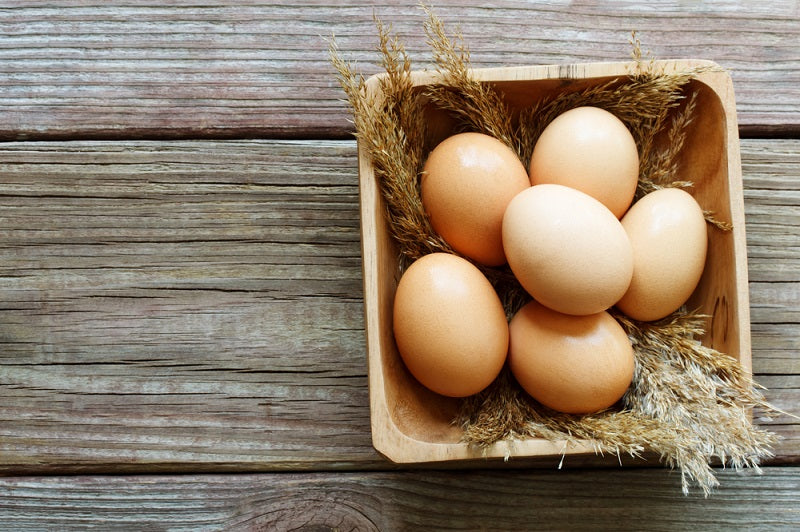
Glutamine is among the most important amino acids and is integral in supporting human health. This article will explain some of the best sources for foods high in glutamine, explain what glutamine is, and how to ensure you’re getting enough.
Top 17 Foods with Glutamine You Should Add to Your Daily Diet
Here is a list of 17 foods that contain glutamine, starting with foods highest in glutamine to the lowest:
-
Chicken
-
Beef
-
Lamb
-
Turkey
-
Pork
-
Seafood
-
Shellfish
-
Eggs
-
Yogurt
-
Milk
-
Cheese
-
Tofu
-
Kidney beans
-
Nuts
-
Red raw cabbage
-
Dark leafy greens
-
Whole grains

Are Eggs High in Glutamine?
It is recommended that individuals should consume about 5 grams of glutamine daily. One single egg contains about 0.7 grams of glutamine. Therefore, if you were to get all of your glutamine from eggs, you would need to consume at least seven eggs!
Luckily, many foods contain glutamine, so it’s not necessary or realistic to get all of your body’s glutamine needs from eggs. Should you choose to have two eggs with your morning breakfast, you’ll already have met nearly 30% of your body’s glutamine needs for the day.
Do Bananas Have Glutamine?
Bananas have way less glutamine compared to animal sources. One large banana contains only about 231 milligrams of glutamine, which translates to about 0.004 grams (1).
To meet your body’s glutamine content needs from bananas, you would need a whopping 1,250 bananas! Obviously, this is unrealistic, and this just shows that plant foods are inadequate to meet your body’s glutamine needs.
Are Glutamine Amino Acid Supplements Effective?
Research suggests that taking a supplement can effectively ensure your body is getting adequate glutamine. Taking glutamine can be particularly effective if you have higher protein needs.
If you follow a plant-based diet, your protein and glutamine needs will likely be greater to meet, which means taking a supplement can be helpful.
Glutamine supplements may also be particularly effective for athletes whose protein and glutamine needs will be higher to fuel the body adequately for performance and recovery.
How Much Glutamine Do I Need a Day?
Many people can meet their body’s glutamine needs through their diet. However, some people may have difficulty meeting their glutamine needs, especially those following a vegetarian or vegan diet. Athletes often have increased protein needs to meet their body’s demands, which means they need more glutamine than the human body produces naturally.
Most people need approximately 5 grams of glutamine daily. For those that choose to take an L-glutamine supplement, anywhere from 3-6 grams daily is adequate and considered safe.
However, some research suggests that consuming up to 14 grams of supplemental L-glutamine daily may be effective (2).
Benefits of Glutamine

Before we can delve into the benefits of glutamine, we must first understand what exactly glutamine is.
Glutamine, known almost interchangeably as L-Glutamine in the sports world, is the most abundant amino acid found in the body. It’s considered a non-essential amino acid, meaning the body can make some independently. However, since strenuous physical activity, stress, and illness may deplete your body's glutamine production, glutamine supplementation makes sense as it becomes more of a conditionally essential amino acid.
Most people will also naturally consume some glutamine through their diet as many food sources naturally contain it. But given the large variation in dietary glutamine intake, supplements can be helpful for some individuals.
While there are two types of glutamine – L-glutamine and D-glutamine – the most abundant and important type is L-glutamine. This form of glutamine is found in foods and supplements.
Now that you understand what glutamine is, you might wonder what glutamine does exactly.
Glutamine works as a building block for protein in the body. Anything that the body needs protein for – to repair cells, make hormones, build muscle tissue and muscle mass, support muscle recovery, and joints, and repair skin – glutamine is also needed.
Glutamine also plays an important role in supporting the immune system and is important for recovery after a severe illness, burn, or surgery.
Continue reading to understand glutamine’s role in gut health, athletic performance, and immune health.
Does Glutamine Help with IBS?
Of the amino acids associated most with gastrointestinal health, Glutamine is considered one of the most important. Glutamine is necessary for the health and functioning of intestinal cells and in a way, serve as the fuel for these cells to work properly.
Without adequate glutamine levels, the cells that line the intestines weaken. As a result, toxins are more able to get through, leading to inflammation, impaired immune health, and compromised digestive system function.
For those with IBS, the integrity of the intestinal lining is often compromised, giving way to many discomforts associated with IBS, such as constipation, diarrhea, bloating, and abdominal pain.
Therefore, taking supplemental glutamine might be helpful in improving the structure and function of the intestinal wall and digestive tract, thereby easy symptoms associated with IBS (3).
L-Glutamine Plays a Role in Athletic Performance
Glutamine also plays an important role in building muscle. Even though glutamine is not essential, meaning the body can naturally make some on its own, glutamine can sometimes become conditionally essential for building muscle mass.
This means that under certain circumstances, when the body can’t make enough amino acids to keep up with its needs, external glutamine is necessary and helpful to meet the body’s demands.
Athletes have greater needs for glutamine since the body needs it to repair and build muscle. There is some research to show that taking glutamine may increase muscle gains. However, more research is needed.
However, much more research suggests that supplementing with glutamine may help with exercise performance by improving recovery and soreness (4).
What’s more, L-glutamine may help with athletic performance by improving endurance and delaying the onset of fatigue (5).
Can Glutamine Boost Immune Health?

Glutamine is also an important amino acid for boosting and supporting immune health. In addition to the intestinal cells utilizing glutamine as fuel, the immune cells also rely on glutamine as a fuel source.
With inadequate glutamine, immune cells may function less optimally and impaired immune function.
When the body is under a lot of stress, such as after an illness or surgery, the immune system is often suppressed, and the body may have a hard time making enough glutamine to support the ability of the immune system to repair itself.
Glutamine supplementation can help the body heal more quickly after illness or trauma or when the immune system has to work hard to keep the body healthy (6).
Who Should Consume Glutamine Rich Foods?
Everyone can benefit from consuming foods rich in glutamine. Plus, glutamine is found in various protein-rich foods ranging from meats, poultry, fish and seafood, dairy products, nuts and seeds, soy products, and even some vegetables.
While all humans need glutamine, some may need more than others depending on their lifestyle and health status.
Who Should Avoid Too Much Glutamine?
Consuming glutamine in food and supplement form is considered safe for most individuals.
However, there are certain people who should avoid taking glutamine in supplement form due to difficulty metabolizing the additional amino acid load.
Those who should avoid L-glutamine supplementation include those with kidney or liver disease. Glutamine is metabolized in the liver, and metabolites are filtered through the kidneys, so these people should avoid supplementation.
Nursing or pregnant women may also want to avoid taking glutamine supplements, as there is not adequate research on the effects in these populations.
Are There Negative Effects of Glutamine?
It’s also important to note that supplements that contain glutamine in its L-glutamine form are safe to take since the body already naturally makes L-glutamine. It’s important to choose a brand like Naked Glutamine with no extra ingredients like artificial sweeteners or flavors.
Luckily, there are not really any side effects of taking glutamine for most people. However, exceeding the recommended amount may lead to stomach pain, gas, vomiting or nausea.
As a general rule, anyone taking glutamine supplements should stick to the recommended daily amount.
When it comes to timing, there’s no best time that you should take a glutamine supplement. It’s important to remember to ensure you are consuming adequate protein on a regular basis and not just relying on glutamine to provide your body with the necessary amino acids.
While glutamine is just one amino acid, there are several others that are necessary for health and functioning.
How Can I Increase Glutamine Naturally?

The best ways to increase glutamine naturally are to work to include glutamine-rich foods in your diet. Consider adding glutamine-rich foods to your meals and snacks, such as an egg, or yogurt, or adding protein such as chicken, beef, or fish to your salad.
You can also power up your salads with collard greens, radish greens, add soya beans or pumpkin seeds--all great sources of glutamine for plant-based eaters.
It’s important to eat consistently throughout the day to ensure many opportunities to bring more glutamine into your diet. Perhaps aim to have 2-3 glutamine-rich snacks in addition to your daily meals.
However, some people may still have trouble getting adequate glutamine from their diet – especially athletes and/or those following a plant-based diet. Those with digestive distress or a suppressed immune system may also have difficulty meeting their glutamine needs. In these cases, a supplement might be helpful in addition to working on increasing your intake of glutamine-rich foods.
Bottom Line
Glutamine is an amino acid that has many important roles in the body. While it’s most well-known for its role in immune health and gut health, glutamine does much more such as build muscle, repair tissues, and improve athletic performance, for example.
While the body can make glutamine on its own, there are many situations where the body is unable to make enough, which is when consuming more glutamine-rich foods and even taking a glutamine supplement can be really important.







